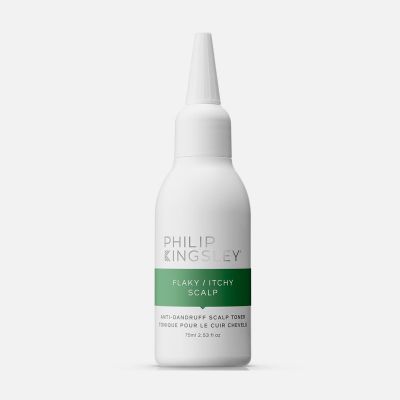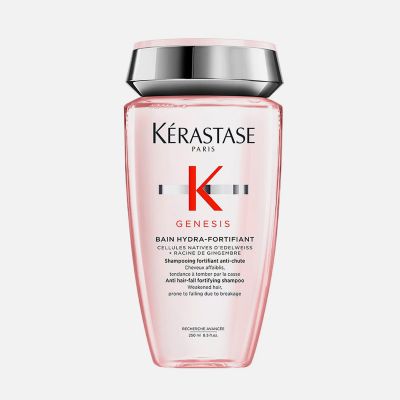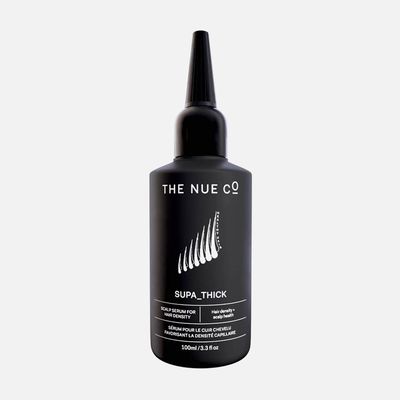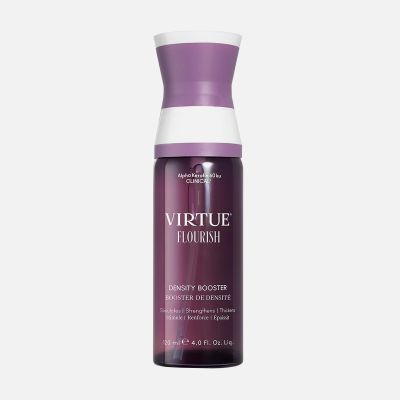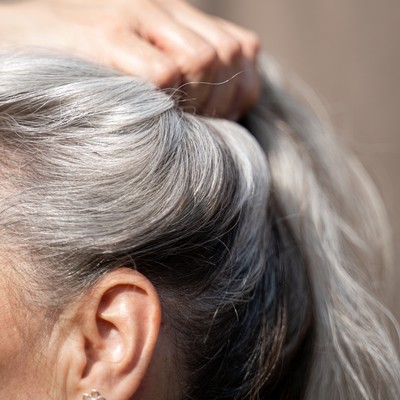
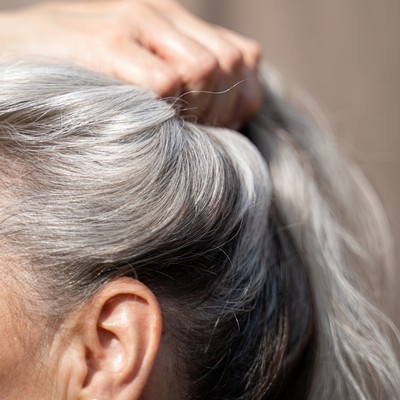
Your Top Hair Thinning Questions, Answered By A Trichologist
All products on this page have been selected by our editorial team, however we may make commission on some products.
Let’s Start With The Obvious – What Are The Key Causes Of Hair Thinning?
“Hair health and thinning are impacted by a huge number of things, including nutrition, diet, lifestyle, stress and hormones. With men, a combination of genetics and the hormone DHT is usually the cause but, for women, this is much more nuanced and lots of things can affect our hormones and therefore, our whole body. It’s also a fact that all of us are subject to decreasing lengths and thickness of hair as we get older. Hair doesn’t always grow for seven years before shedding – the length of hair growth cycles can change and, as you age, you often get a decline in this length of hair growth cycle. For example, it can decrease to three years, two years or even less. The hair growth cycle is what changes with age, impacted by the fact that hair follicles move up towards the surface of the skin where there are fewer blood vessels.” – Jane Mayhead, trichologist at The Private Clinic in Harley Street
On The Topic Of Changes, How Does The Perimenopause And Menopause Affect Hair?
“Perimenopause and menopause are perhaps the biggest contributing factors to age-related hair diameter changes. The average age for perimenopause is in our early to mid 40s (sometimes sooner or later) and this is when our hormone levels can become unpredictable, which can lead to excessive shedding. The hair growth cycle is closely regulated by hormones so, when they are sporadic, it can cause periods of extra hair fall. The physical and emotional stress of menopause can also contribute to shedding. With a decline in oestrogen and progesterone at menopause, many of us also notice a reduction in the volume of hairs on our scalp. Oestrogen is both scalp skin and hair supportive – it helps to keep hairs in the anagen (growth) phase for their optimal length of time. As levels fall, hairs can become finer and unable to grow as long as they used to. Some women only start to see diameter changes during menopause but, for women who already have hair thinning, hormonal changes can exacerbate it.” – Anabel Kingsley, consultant trichologist and brand president at Philip Kingsley
So, Is It All A Case Of When, Not If, Or Can We Prevent Thinning?
“It’s not all doom and gloom – staying on top of your general health and eating a nutritious diet will help to keep your hair as healthy as possible. It’s also essential you maintain good scalp health. Your scalp is your hair’s support system and the bedrock of your hair follicles. Keep it healthy by cleansing it regularly and using targeted topicals to address any issues such as flaking or irritation. If you do notice your hair diameter changes, there’s lots that can be done to prevent further deterioration and promote new growth. Proven treatments include Minoxidil and topical hair supportive hormones. Certain HRTs can be helpful, too.” – Anabel
“In terms of prevention and to get ahead of the game, my advice would be to seek help from a qualified expert as soon as you notice thinning. In my clinic, I use prescription combination therapies, which can be either topical or oral; however, topical seems to work more favourably. Topical products such as Minoxidil and Finasteride and anti-androgen therapy are proven ways to help thinning hair. However, Finasteride is not suitable for pre-menopausal women, so treatment is always case by case. The Private Clinic also offers a Calecim Hair Loss Treatment, which is a professional advanced hair serum which contains a combination of key proteins and growth factors. The treatment involves the serum being infused into the scalp with a micro needling device such as Dermaroller or Dermastamp. In other words, help is on hand and there’s plenty you can do to reverse and prevent the issue of hair thinning.” – Jane
Are There Any Easy Lifestyle Habits You Can Tweak To Prevent Damage And Thinning?
“Yes! Many of us are surprised by how much damage improper daily handling of the hair can cause. While most things – tight hairstyles being the exception – don’t cause hair loss from the scalp, they can really impact hair’s condition and cause breakage, which thins out the mid-lengths and ends. Opt for loose styles that don’t put traction on your scalp or hair. At the very least, tight hairstyle cause breakage but, more seriously, they can cause traction alopecia, whereby hairs are pulled from the follicle and this can cause permanent loss. Brush gently too. Test your brush on the back of your hand to see if it feels scratchy – hair doesn’t have nerve endings, so it’s hard to tell when you’re damaging it. It’s key you never brush hair when it’s wet either. Wet hair is weaker as it’s already stretched by water. Instead, use a microfiber towel to remove moisture and don’t rub your hair – squeeze gently. Finally, be wary of scalp brushes as these can be quite abrasive. For scalp exfoliation, your fingertips and a mild chemical exfoliant are best.” – Anabel
We’ve Touched On Treatments, But Are There Any Others Which Stand Out?
“As mentioned, scalp health is important and therapies such as micro needling can help to increase the blood flow here on a cellular level. The result? Better growth, but also the strengthening of your hair’s fibres. PRP can help too – this treatment involves taking a small amount of your blood and separating this blood in a centrifuge. This is then injected into the scalp. The growth factors inside your blood can then stimulate the activity of the hair follicles and promote hair growth in areas of thinning or loss. It sounds intense, but it’s surprisingly swift and efficient – you’ll be evaluated by a professional on a case-by-case basis. Above all though, understanding the cause of your hair loss is essential, as this will determine the right type of treatment for you.” – Jane
“Minoxidil has by far the most evidence and longevity of data supporting its effectiveness for female pattern hair loss, and I always recommend this where relevant as I am confident it has the best chance of working. Applied topically with hair supportive hormones, like oestrogen and progesterone, it has the best effect. We compound prescription scalp drops at our London clinic which have great results.” – Anabel
With The Above In Mind, Can You Ever Reverse Hair Thinning? Or Is That A Myth?
“Yes, it’s true that certain cases of hair loss won’t respond as well to treatment as others. However, in the vast majority of cases – and especially with women – improvement is always seen, which should be known. The key is consistency with treatment and to give everything time – at least six months.” – Anabel
Let’s Chat Stress – How Does This Impact Hair Thinning, If At All?
“Stress itself isn’t a cause of hair loss and thinning – I often tell people, you can’t worry your hair out. However, it can have a knock-on impact on the things that do support healthy hair growth, such as our hormones and diet. Stress and hair thinning is so much more nuanced than people realise. While Alopecia Areta can be triggered by stress, it’s an auto-immune disease which anything can trigger – not just stress. Stress adds to the problem, but it won’t in itself cause thinning.” – Jane
“I second all of the above. What stress can do is exacerbate scalp conditions like dandruff and seborrheic dermatitis. Flaking of the scalp can then increase hair shedding and impact the integrity of your hairs as they grow, making them less robust. Stress also impacts how you eat, which affects how you absorb nutrients. It’s a nasty cycle, which shows stress still needs management for an overall approach.” – Anabel
Is It True Certain Vitamins Can Help With Both Hair Thinning And Loss?
“Ensuring that your body is getting all the nutrients and vitamins it needs is essential for healthy hair growth. If you’re lacking in any nutrients, it can have a knock-on effect on the hair. However, taking vitamins if you don’t have a deficiency can also have a negative impact on the body. So, the key is to see a trichologist who will typically carry out a blood test and/or other assessments in order to establish if any vitamin supplements are needed. Vitamins D and iron can help to support hair health but, again, these are only beneficial and worth taking if you are lacking them.” – Jane
What Tests Can Be Done To Check Why Hair Thinning Is Occurring? What Do You Recommend?
“A simple blood test is the first line of assessment if a patient is experiencing hair thinning. That helps to look at anything that could be going on in terms of hormones and deficiencies. I also like to do a hair analysis test at my clinic. This involves the patient not washing their hair for five days and then, on the fifth day, washing their hair and collecting all the hair that they shed in a cloth. I analyse this and can ascertain a great deal from the amount of hairs that have been shed, as well as the length of the hairs and so on. You can also have hair analysed for protein loss and degradation with resolution imaging.” – Jane
Any Guidance On What The Diet Should Look Like To Avoid Thinning Hair?
“Diet doesn’t cause hair thinning, but it can definitely cause telogen effluvium/hair shedding and impact the strength of hairs as they grow. Hair is non-essential tissue so it’s the first part of us to be withheld from when our diet is lacking. Hair cells are also the second fastest dividing cells the body makes, meaning its energy requirement are high. As a needy but not needed tissue, hair is incredibly sensitive to any dietary inadequacies – even small ones that may not impact general health. Deficiencies in iron, ferritin (stored iron), vitamins B12 and D commonly cause excessive shedding and lack of length. Lack of protein usually results in brittle hair. Don’t skip meals and eat a healthy, balanced diet containing proteins, complex carbohydrates, healthy fats and a variety of fresh fruits and vegetables. Taking a supplement is also helpful – due to hair’s unique nutritional demands, it can be difficult to meet its needs through diet alone. I love our Density Healthy Hair Complex and Amino Acid Protein Booster which are formulated specifically for your hair’s requirements.” – Anabel
Hair Loss And Thinning Often Get Confused – What Are The Key Differences?
“Hair thinning, or female pattern hair loss, is largely genetic. It changes the hair follicles on your scalp, causing them to become smaller and produce slightly finer and thinner hairs with each growth cycle, resulting in a loss of volume. It is gradual and progressive. Hair loss/hair shedding/telogen effluvium is when you suddenly see too many hairs coming out on a daily basis. This is a reactive type of hair loss that results from an internal imbalance or disturbance – most commonly from vitamin and mineral deficiencies, thyroid issues, stress, rapid weight loss, illness, certain medications and postpartum. TE is not genetic; it does not change the hair follicle and hairs grow back as before once the underlying cause is found and addressed. However, it’s important to note that hair thinning and excessive daily hair shedding can occur alongside each other.” – Anabel
There Are Endless Hair Loss Myths – Which Bug You The Most And Why?
“Firstly, there is this odd misconception that shampooing too much causes hair loss. It’s the opposite – shampooing promotes hair growth as it keeps the scalp clean, healthy and free of flakes. Scalp is skin and so it benefits from a regular cleanse. You see more hair when you shampoo because the act of massaging simply dislodges hair that is no longer growing and is sitting detached in the hair follicle. Secondly, it’s a myth that hair thinning only happens to older women. It can occur at any age – even right after puberty. In fact, the majority of my clients are young women.” – Anabel
“A myth that bugs me is that hair thinning treatments are always expensive. This isn’t true – a lot of the topical treatments that I prescribe can cost around £50 a month. Granted that’s still an investment, but it’s certainly not as eye watering as you may think.” – Jane
Lastly, What Do You Advise For Those Suffering With Thinning And, In Turn, A Lack Of Confidence?
“It’s natural for hair thinning and loss to impact confidence. However, I would say that we are fortunate to live in an age where there is a greater awareness and understanding of this than ever before, so by seeking help with a qualified and experienced practitioner it is possible to address the problem with effective results which don’t necessarily have to be expensive.” – Jane
“Firstly, know that you are not alone. Hair loss in women of all ages is so common – it simply isn’t yet talked about as much as it should be. There is almost always a way to get your hair in better condition and to improve the hair you have – from products that add immediate body and volume for an instant confidence boost to topical and oral treatments that work effectively on the hair follicle and hair growth cycle. For instant body and for regulating hair shedding, I love our Density Range which we specifically formulated for those with fine, thinning hair. Whenever a hair loss issue is present, it’s best to take a holistic approach that optimises all factors that can impact hair growth – from diet, stress levels, general health and scalp health to hair condition and styling habits.” – Anabel
Visit ThePrivateClinic.co.uk & PhilipKingsley.co.uk
Considering Seeing A Trichologist? Here Are Five London Clinics We Rate:
1. Philip Kingsley, 54 Green Street, Mayfair
2. The Private Clinic, 98 Harley Street
3. Omniya Clinic, 3a Montpelier Street, Knightsbridge
4. Ricardo Vila Nova, Harrods, Knightsbridge
5. Lucinda Ellery London, Hammersmith
OUR FAVOURITE PRODUCTS TO HELP WITH THINNING HAIR
DISCLAIMER: We endeavour to always credit the correct original source of every image we use. If you think a credit may be incorrect, please contact us at info@sheerluxe.com.
